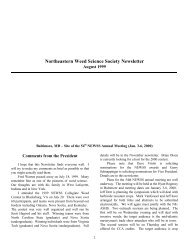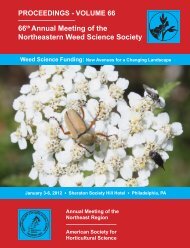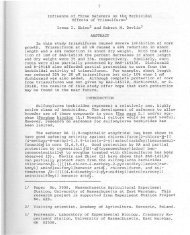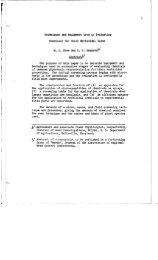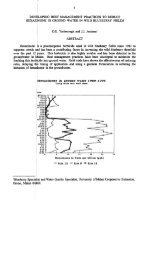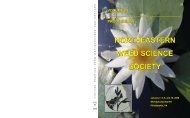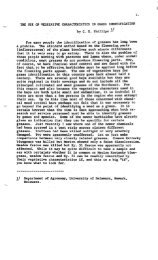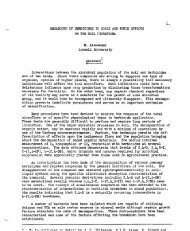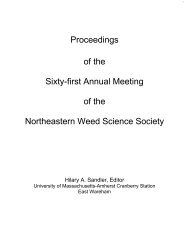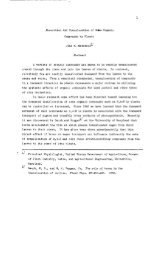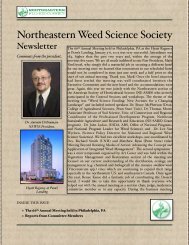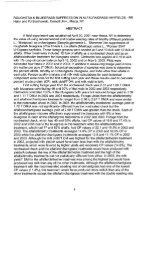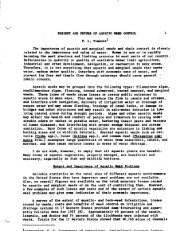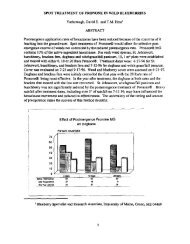Vol. 54â2000 - NorthEastern Weed Science Society
Vol. 54â2000 - NorthEastern Weed Science Society
Vol. 54â2000 - NorthEastern Weed Science Society
You also want an ePaper? Increase the reach of your titles
YUMPU automatically turns print PDFs into web optimized ePapers that Google loves.
WATER GARDENI WEED GARDEN?<br />
S. T. Hoyle and S. H. Kay I<br />
ABSTRACT<br />
Thepopularityof water gardeninghasincreaseddramaticallyin NorthCarolinaand<br />
throughoutthe countryduringthe past few years. Sales of equipmentandplants for water<br />
gardenshave nearlydoubledannuallyoverthepastfive years.andindustryprojectionssuggest<br />
thatthis rateof increasewill continueforanotherfive years.<br />
Thedemandforwaterandwetlandplantshasspawnedthegrowthof aquaticplantnurseries.<br />
In some cases,plantscontainundesirable,highlyinvasivespeciessuchas hydrilla(Hydri//a<br />
verticil/ala LJ. Royle) as contaminants.A numberof undesirablespecies such as giantsalvinia<br />
(Sa/vinia mo/esta D. S. Mitchell) have been cultivated, sold, and distributed widely, either<br />
mistakenlyor intentionally.underthewrongscientificandcommonnames. The increasing<br />
availabilityof plantsfrom mail orderandon-line catalogsbasonly aggravatedthis situation.<br />
The greatmajorityof these plantsneverbecomeproblems. However, a few have provento he<br />
highly invasive including waterhyacinth [Eichhornia crassipes (Martins) Solms-Laubacb] and<br />
purpleloosestrife (Lythrum salicarta L.) andhave causedsignificantenvironmentaldamage<br />
through habitat destruction. In 1999, waterhyacintlts were found in several locations in North<br />
Carolina. Eachof these "new"infestationshavebeentracedbackto intentionalintroductions<br />
fromwatergardens. Preventingtheintroductionandspreadof noxious aquaticweeds can save<br />
millionsof dollarsof publicandprivatemoneyannually forweed controlactivities.<br />
Justbecause a plantis interestingorhasa prettyflower doesnot constitutejustification for<br />
releasing it into the environment. Invasivespecies includinggiant salvinia andhydriIla,both<br />
FederalNoxious <strong>Weed</strong>s,arenotnativeto theUnitedStatesandhave enteredeitheras<br />
contaminantsamongotherplantsor as intentionalintroductions.Is this whatYOU want in your<br />
ponds and lakes? Moreover, how much are you willing to spend to get rid of those plants,<br />
which become weedy? Carefulconsiderationof the natureof the plants you intendto put intoa<br />
water garden, aquascape, or wetland can reduce the likelihood of inadvertently creating a weed<br />
managementproblem. Even plantsnativeto one partof the countrymay beinvasive in another<br />
part of the country. A wise approachis to select vegetation native to the region where it is to be<br />
plantedand, wheneveravailable,to use only those species which usually arenot invasive.<br />
The best assuranceof having attractive, trouble-free water gardens, aquascapes, and wetland<br />
plantings is careful plant selection. Educate yourself about the nature of aquatic and wetland<br />
plants,and know whatyou want beforeyou purchase. Beware of salesmen who seem too eager<br />
to sell you large numbersof expensive, prettyplantsandwho assureyou thatthey are not<br />
invasive andwill never become troublesome. Evenwhen purchasingnative plants from local<br />
sources, be sure yourplantsare free of unwanted.contaminants. Visit the nursery,andlook<br />
carefully at the plants they have for sale to determine that there are no unwanted plants mixed<br />
with them. Also, be surethat your source of plants is a state-certifietl nursery or dealership. If<br />
you find that you have too many plants, dispose of them properly - NEVER dump them into the<br />
ditch, pond, lakeor riverwhere they may become someone's problem.<br />
, Agricultural Research Tech., and Associate Professor, Crop <strong>Science</strong> Department, NC State<br />
University, Raleigh, NC 27695<br />
84



